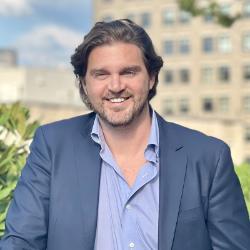 UF Center for Latin American Studies
UF Center for Latin American Studies
Dr. Korsant brings expertise in teaching and social anthropology, plus enthusiasm for student mentorship and intellectual process

August 15, 2022
As the 2022-2023 academic year begins, the Center is welcoming a new addition to our team! Dr. Clate Korsant will serve as the Assistant Director of Academic Affairs, overseeing our MALAS advising and other academic programming.
Read on to learn more about Dr. Korsant!
 Q&A with Dr. Clate Korsant, Assistant Director of Academic Affairs
Q&A with Dr. Clate Korsant, Assistant Director of Academic AffairsQ: What is your background?
A: My background is in teaching, actually – that’s what I started doing right out of college, teaching high school and middle school. I taught in Colorado Springs and then at a bilingual school in Puerto Rico, which gave me some experience living and working in Latin America. And then I got interested in anthropology, particularly cultural anthropology, in part due to that immersive experience learning new things being around different people, as an educator. So I went back to school to pursue anthropology. [Note: Dr. Korsant has a B.A. in History, an M.A. in Teaching, an M.A. in Cultural Anthropology, and a Ph.D. in Social Anthropology.]
Q: What is it that you love about anthropology?
A: I love the ethnographic process. And anthropology is so well-suited for Latin American Studies, because it’s so interdisciplinary. Cultural anthropology in particular allows you to pull from many different places because the science of the human is so broad. You can really look at any problem in a number of ways, but you’re always situated in the question of what people are doing. So I really love what ethnography offers in terms of storytelling, and its intellectual process, and how open it is to bringing in new ideas.
Q: Tell us a little bit about your research in political ecology and socio-political justice in Costa Rica.
A: Sure. I looked at environmental activism in the Osa Peninsula, which is notable for its high level of biodiversity per unit area, not just for Costa Rica but for the world – it’s comparable in some places to Amazonia. Eighty percent of the Osa Peninsula is conserved or under some type of government controls, which means that not only is there an ecological research interest for scientists and activists, but now, after the tourism boom in Costa Rica, there’s a major ecotourism interest too. So there are all these entanglements that paint a picture of environmentalism in practice and what that means for rural spaces with a history of resource extraction and power dynamics at play.
Q: What drew you to the topic?
A: Well, I’ve always been interested in environmentalism, and I wanted to pursue a research topic that contributes to the discipline but that I also felt close to. I also knew I wanted to do international research, preferably in Latin America because I’m passionate about the region. I wanted that cultural immersion, in Spanish, in the community. And I was drawn to ethnographic storytelling and critical social analysis, which really blend together the important questions that surround socioenvironmental conflict and justice. [Note: After completing his dissertation (“Environmentalisms in Practice: From National Policy to Grassroots Activism in Costa Rica’s Osa Peninsula”), Dr. Korsant produced and wrote the ethnographic documentary film “Lifting the Green Screen” based on his research.]
Q: What are you looking forward to most about working at the Center?
A: I’m most excited for the opportunity to teach and work with students. Advising the MALAS students is something that really excites me. It wasn’t that long ago that I was a graduate student, so the idea of being able to share my experience and mentor graduate students along that journey is really appealing to me. I’m also thrilled to develop the Intro to Latin American Studies course for the undergrads, because we’re going to look at the discipline from the perspective of the arts and literature. Through that lens, we can look at Latin America not just as a region, but a network of themes. I’m really looking forward to that as well.
Q: What are your goals or a philosophy for working with students?
A: For the graduate students, I hope I’m able to help them get the most out of grad school, and prepare them on what to expect next, whether it’s a Ph.D. program or a profession. I want them to know what they’re getting into when they consider academic research, and think more deeply about not just what they’re gathering or collecting from the field, but what they’re putting out there. More generally, as a teacher, my goal is always to nurture critical thinking in a student-centered classroom. Teaching is about helping students dig deeper into everyday worlds and giving them tools to reach their own conclusions. They’re on an intellectual journey and their learning is never really completed. Teaching is like being a guide on that journey.
Read Dr. Korsant's full bio here